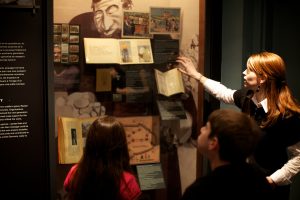In building and running the world’s largest gold producer, Peter Munk realized every Jewish immigrant’s dream of living in the goldene medina (golden country).
The man with the Midas touch, as editorialists loved to describe him, died March 28 in Toronto at the age of 90.
A high-flying entrepreneur who counted presidents, princes and prime ministers as friends, Munk founded and controlled Barrick Gold, the largest gold miner in the world, and the TrizecHahn real estate empire, which he sold in 2006.
He gave vast sums to charities – an estimated $100 million through his eponymous foundation to a variety of concerns in the fields of health, education, public policy and the arts.
READ: A FRESH START: THE STORY OF CANADA’S POSTWAR JEWISH ORPHANS
Munk often said that his miraculous escape from Nazi-occupied Hungary would shape his outlook later in life. In just one example, when wildfires roared through Fort McMurray, Alta., and forced the evacuation of more than 80,000 residents, he donated $1 million to the Red Cross, reasoning, “I know what it’s like to lose everything.”
He was born on Nov. 8, 1927, in Budapest to well-off parents, Katherine Adler and Louis L. Munk, who, like all Hungarian Jews, managed to stave off deportation until later in the war.
Peter was just 16 when 14 members of his family fled the Nazi invasion of March 1944 aboard the famous Kastner train, which carried 1,684 Jews to safety in Switzerland. It was arranged by journalist and lawyer Rudolf Kastner, who was assassinated in 1957 in Israel after a court there accused him of having collaborated with the Nazis.
The Munk family assured its safety with bribes of gold, jewelry, gems and currency, and arrived in Switzerland, where Peter pursued a life of partying, ski trips and chasing girls. Later, in 1949, he was sent to Canada to live with an uncle.

After jobs picking tobacco and selling Christmas trees (he was once left with thousands of unsold trees), he graduated from the University of Toronto in 1952 with a degree in electrical engineering. His big break came a few years later when he and a partner founded Clairtone Sound, which made “hi-fi” (high-fidelity) consoles in sleek, Scandinavian wood cabinets that included radios, turntables and, later, televisions. In their day, they were recognizable and prized.
But the business faltered, so Munk and his partner, David Gilmour, decamped to Fiji to invest in a hotel. Finally, there was success, as the duo turned the enterprise into the Southern Pacific Hotel Corp., which, at its peak, consisted of 54 resorts across the South Pacific.
After returning to Canada in 1979, Munk formed the privately held Barrick Petroleum in 1980, which invested heavily in oil and gas. But after racking up losses, he decided to focus on gold. He acquired struggling mines in Nevada and Quebec, and the Nevada mine turned out to contain the largest gold deposits in North America.
Munk took the company, renamed Barrick Resources, public on the Toronto Stock Exchange in May 1983 and never looked back. After another name change (in 1995), Munk stepped down as CEO of Barrick Gold in 1998, but continued to serve on the company’s international advisory board. Barrick Gold went on to produce a record 5.5-million ounces in 2016.
In 1994, Munk bought Calgary-based Trizec Corp., which he renamed TrizecHahn and sold in 2006. Among the company’s vast holdings were Toronto’s CN Tower, Place Ville Marie in Montreal and the infamous Watergate Hotel in Washington, D.C.
Munk’s name became associated with a slew of charitable endeavours. The Peter Munk Charitable Foundation was founded in 1992. In 2006, he announced a $37 million gift to Toronto General Hospital, the largest donation ever to a Canadian medical institution. It would help support the Peter Munk Cardiac Centre, which Munk had helped create with a $6-million donation to the hospital a decade earlier.
There was more: a $35-million donation in 2010 to the University of Toronto’s Munk School of Global Affairs. The donation enabled a dramatic expansion of the Munk Centre for International Studies, which he had helped create, and established the famous Munk Debates.
He also donated to the Technion-Israel Institute for Technology.
Munk was invested in the Order of Canada as an officer in 1993 and promoted to companion in 2010 as “one of Canada’s great entrepreneurs who is equally renowned for his philanthropic work in Canada and abroad.”
If Munk was known for anything besides his philanthropy and business acumen, it was for his love of Canada.
“He has regarded being Canadian not as a taken-for-granted act of citizenship, but as a badge of honour that he had to earn – and then keep on earning,” wrote fellow Jewish immigrant Peter C. Newman in his book, The Barrick Story.
Canada is “a country of peace, law, justice, freedom and free education,” Munk told the Globe and Mail in 2010. “We have the largest multiracial society in the world. Canada is as good as it gets.”
He arrived here not speaking the language – “not knowing a dog,” as he once said in a speech to the Canadian Club. “This is a country that does not ask about your origins. It only concerns itself with your destiny.”
Munk is survived by his wife, Melanie, five children and 14 grandchildren.






